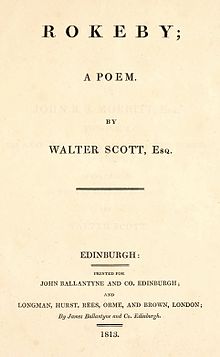Rokeby (poem)

First edition title page
|
|
| Author | Walter Scott |
|---|---|
| Illustrator | Thomas Stothard |
| Country | United Kingdom |
| Language | English |
| Genre | Epic poem, verse novel |
| Publisher | John Ballantyne, and Longman, Hurst, Rees, Orme, and Brown |
|
Publication date
|
1813 |
Rokeby (1813) is a narrative poem in six cantos by Walter Scott. It is set in Teesdale during the English Civil War.
At Oswald's instigation Bertram makes an attempt on the life of Philip, which he mistakenly thinks has succeeded, and an attack on Rokeby Castle, in which the castle is set on fire. Wilfrid and Matilda, through the efforts of Redmond, are able to escape the blaze. It emerges that Redmond, now in Oswald's hands, is the long-lost son of Philip, and that Philip has survived the assassination attempt. Oswald tries to force Lord Rokeby to accept a marriage between Wilfrid and Matilda, but this is prevented by Wilfrid's death. Bertram kills his master Oswald to avoid further bloodshed, but is killed in his turn. Philip is reunited with his son, and the young lovers marry.
The poem grew out of Scott's friendship with J. B. S. Morritt, an antiquary and Member of Parliament, whose home at Rokeby Park in Teesdale was, Scott felt, unduly short of local legends. With Rokeby he attempted to remedy this fault. Scott claimed that the character of Matilda was drawn from his first love, Williamina Belsches, whom he had first met twenty years earlier, and who had recently died. He began his poem while living at Ashestiel, but continued it in the middle of the noise and confusion of building work on his magnificent new home, Abbotsford, and he hoped that Rokeby’s success would pay the bills for this project. Canto 1 had to be rewritten when Scott deliberately burned the first version, saying he had "corrected the spirit out of it". The last instalment of the manuscript was sent off to the printer on 31 December 1812, and the book was published on 10 January 1813.
Sales were initially promising. J. G. Lockhart reported that bookshops in Oxford were besieged by customers wanting to read the poem, and bets were placed as to whether Rokeby would outsell Byron's recent Childe Harold's Pilgrimage. Byron himself wrote urgently from Italy asking his publisher John Murray to send him a copy. In the event Rokeby sold ten thousand copies in the first three months, a figure which would have been the making of any other poet, but which was a marked falling-off from the sales of Scott's previous poems, and far less than he needed to pay his Abbotsford debts. One consequence of this was that Scott, dismissing Rokeby as "a pseudo-romance of pseudo-chivalry", decided that Byron had displaced him as the country's favourite poet, and that he should try his hand at novel-writing instead.
...
Wikipedia
